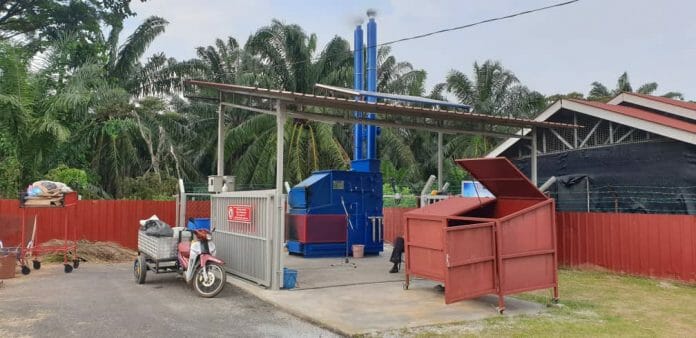Pamarai has introduced Asher, a cutting-edge technology that simply turns plastic and solid waste into ash through thermal degradation. A versatile and easily deployed machine, the Asher does not require any external accelerants or fossil fuel (diesel, gas, petrol, coal) to generate heat for its thermal degradation process to turn waste into ash.
The emission and ash emitted also complies with the United States Environmental Protection Agency’s (US EPA) standards and the formidable machine has been awarded the MyHIJAU Mark certificate from the Malaysian Green Technology and Climate Change Centre (MGTC). 100% made in Malaysia by Malaysians, the Asher is already proving itself to be the definitive solution to the solid waste management problem.
“Traditional landfills are a waste of space and are a major threat to the environment. The losses and damages that a landfill creates for the environment are hugely devastating. Imagine a place where we no longer need landfills, we eliminate long haul transportation, risks of leachate going into our water system, significantly reducing greenhouse gasses. The Asher can make this a reality.
We can divert waste from going to the landfills, and eventually, rendering landfills to be a thing of the past. Decentralising waste management, treating waste from the source, if you will. “Waste-marked lands” can then be opened up to better, productive, and sustainable use. With the Asher, nothing really goes to waste, because even the ash from the Asher can be repurposed as soil conditioner or construction filler. This is in line with the United Nation’s Sustainable Development Goals,” shared Executive Chairman and co-founder of Pamarai, Datuk Mohamed Razeek Md Hussain.
“With the Asher, corporations, large and small can truly play their part to protect the environment. We are currently facing a worldwide crisis that necessitates us to clean up the Earth, it is high time we take a stand, and start making better decisions towards that. The Asher can help bring us on that path, it operates at greater efficiency and has far better environmental impact compared to conventional incinerators, whilst doing so at a fraction of the price. With the excess funds saved, companies will be able to focus on revamping employee benefits, diverting more resources to effective research and development, and ultimately leading to more efficient production and output. Governments can redistribute funds for socio-economic development, better education provision, better healthcare access, and sustainable infrastructure.
Let the Asher handle the “dirty work” while companies can focus on their main business, and governments can focus on building the nation and their citizens,” added Pang Swee Lei, Executive Director and co-founder of Pamarai.
The Asher can be deployed and used anywhere and only requires low upkeep, has easy operational protocols, and a non-complex manufacturing process. From cities to rural areas, hospitals to hotels, rivers to beaches, mountains to islands; the Asher is adaptable, highly flexible and offers reasonable and practical financial implication (tangible and intangible) for both the private and public sectors.
Accommodating various enterprise sizes, the Asher currently comes in 3 different models, with the capacity to treat from 1 to 4 tonnes per day (depending on the operational hours, choice of variant and protocols). The throughput ranges from 40 – 240 kg of waste per hour; depending on the moisture content and mode of operation.
As all 3 models forego external energy for the heat-treatment process, the solid waste deposited into the machine also doubles up as the fuel source. The specially formulated refractory chamber within the machine is capable of absorbing, retaining, and exuding heat perpetually. Because of this revolutionary feature, the Asher also enjoys a very small carbon footprint, as it does not consume any fossil fuels to operate nor does it require any post-process handling or treatment, producing almost no secondary discharge or contamination at all.
On top of that, the Asher is also self-sustainable and can fully function just by using solar energy. For the electric-variants, the electric power is meant only to run the water pumps and blower fans and is not for any form of heat generation. Fitting snugly within a typical space to park one car, the Asher is designed and built to be SSC – slim, simple and compact. It is versatile and can easily be re-deployed and transported across different locales, terrains, and weather – ultimately adding additional value to corporations as it not only saves operating costs, but also space.
Additionally, the emission coming from the Asher is non-toxic, and efficiently complies with the US EPA standards. This is validated and verified by well-known and accredited testing laboratories and certification bodies such as SGS, MYCO2, SIRIM, EXOVA, SUCOFINDO, and PONY.
The Asher has also received its MyHIJAU Mark certificate from the MGTC in September 2020. Through the certification, eligible private companies that procure the Asher can potentially participate in the Green Investment Tax Allowance programme, which allows business owners to enjoy up to 100% tax incentives on the capital expenditure incurred when approved.
“Global emergencies such as climate change have been at the forefront of our minds ever since founding the company. We have been trying our best to slow down, or even reverse the effects of climate change, one small step at a time. This is not just for us. This is to make sure that our children and their children will have a safe future. With the Asher, we are confident that small enterprises to large corporations can play their role in helping, preserving and saving Mother Nature.
“One day, when we have successfully placed the Asher everywhere, it simply means that we have availed an equal opportunity to everyone, to live in a clean, bright and beautiful environment,” added Pang Swee Lei.
Presently, there have been more than 80 Ashers delivered, deployed, and commissioned in 13 countries such as Singapore, Indonesia, China, Philippines, Cambodia, Thailand, South Africa, Saint Lucia, and many more.









